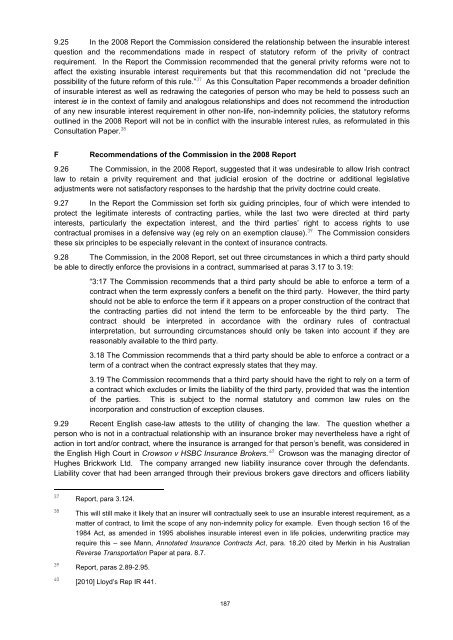Insurance Contracts CP - Law Reform Commission
Insurance Contracts CP - Law Reform Commission
Insurance Contracts CP - Law Reform Commission
Create successful ePaper yourself
Turn your PDF publications into a flip-book with our unique Google optimized e-Paper software.
9.25 In the 2008 Report the <strong>Commission</strong> considered the relationship between the insurable interest<br />
question and the recommendations made in respect of statutory reform of the privity of contract<br />
requirement. In the Report the <strong>Commission</strong> recommended that the general privity reforms were not to<br />
affect the existing insurable interest requirements but that this recommendation did not ―preclude the<br />
possibility of the future reform of this rule.‖ 37 As this Consultation Paper recommends a broader definition<br />
of insurable interest as well as redrawing the categories of person who may be held to possess such an<br />
interest ie in the context of family and analogous relationships and does not recommend the introduction<br />
of any new insurable interest requirement in other non-life, non-indemnity policies, the statutory reforms<br />
outlined in the 2008 Report will not be in conflict with the insurable interest rules, as reformulated in this<br />
Consultation Paper. 38<br />
F<br />
Recommendations of the <strong>Commission</strong> in the 2008 Report<br />
9.26 The <strong>Commission</strong>, in the 2008 Report, suggested that it was undesirable to allow Irish contract<br />
law to retain a privity requirement and that judicial erosion of the doctrine or additional legislative<br />
adjustments were not satisfactory responses to the hardship that the privity doctrine could create.<br />
9.27 In the Report the <strong>Commission</strong> set forth six guiding principles, four of which were intended to<br />
protect the legitimate interests of contracting parties, while the last two were directed at third party<br />
interests, particularly the expectation interest, and the third parties‘ right to access rights to use<br />
contractual promises in a defensive way (eg rely on an exemption clause). 39 The <strong>Commission</strong> considers<br />
these six principles to be especially relevant in the context of insurance contracts.<br />
9.28 The <strong>Commission</strong>, in the 2008 Report, set out three circumstances in which a third party should<br />
be able to directly enforce the provisions in a contract, summarised at paras 3.17 to 3.19:<br />
―3:17 The <strong>Commission</strong> recommends that a third party should be able to enforce a term of a<br />
contract when the term expressly confers a benefit on the third party. However, the third party<br />
should not be able to enforce the term if it appears on a proper construction of the contract that<br />
the contracting parties did not intend the term to be enforceable by the third party. The<br />
contract should be interpreted in accordance with the ordinary rules of contractual<br />
interpretation, but surrounding circumstances should only be taken into account if they are<br />
reasonably available to the third party.<br />
3.18 The <strong>Commission</strong> recommends that a third party should be able to enforce a contract or a<br />
term of a contract when the contract expressly states that they may.<br />
3.19 The <strong>Commission</strong> recommends that a third party should have the right to rely on a term of<br />
a contract which excludes or limits the liability of the third party, provided that was the intention<br />
of the parties. This is subject to the normal statutory and common law rules on the<br />
incorporation and construction of exception clauses.<br />
9.29 Recent English case-law attests to the utility of changing the law. The question whether a<br />
person who is not in a contractual relationship with an insurance broker may nevertheless have a right of<br />
action in tort and/or contract, where the insurance is arranged for that person‘s benefit, was considered in<br />
the English High Court in Crowson v HSBC <strong>Insurance</strong> Brokers. 40 Crowson was the managing director of<br />
Hughes Brickwork Ltd. The company arranged new liability insurance cover through the defendants.<br />
Liability cover that had been arranged through their previous brokers gave directors and officers liability<br />
37<br />
38<br />
39<br />
40<br />
Report, para 3.124.<br />
This will still make it likely that an insurer will contractually seek to use an insurable interest requirement, as a<br />
matter of contract, to limit the scope of any non-indemnity policy for example. Even though section 16 of the<br />
1984 Act, as amended in 1995 abolishes insurable interest even in life policies, underwriting practice may<br />
require this – see Mann, Annotated <strong>Insurance</strong> <strong>Contracts</strong> Act, para. 18.20 cited by Merkin in his Australian<br />
Reverse Transportation Paper at para. 8.7.<br />
Report, paras 2.89-2.95.<br />
[2010] Lloyd‘s Rep IR 441.<br />
187

















